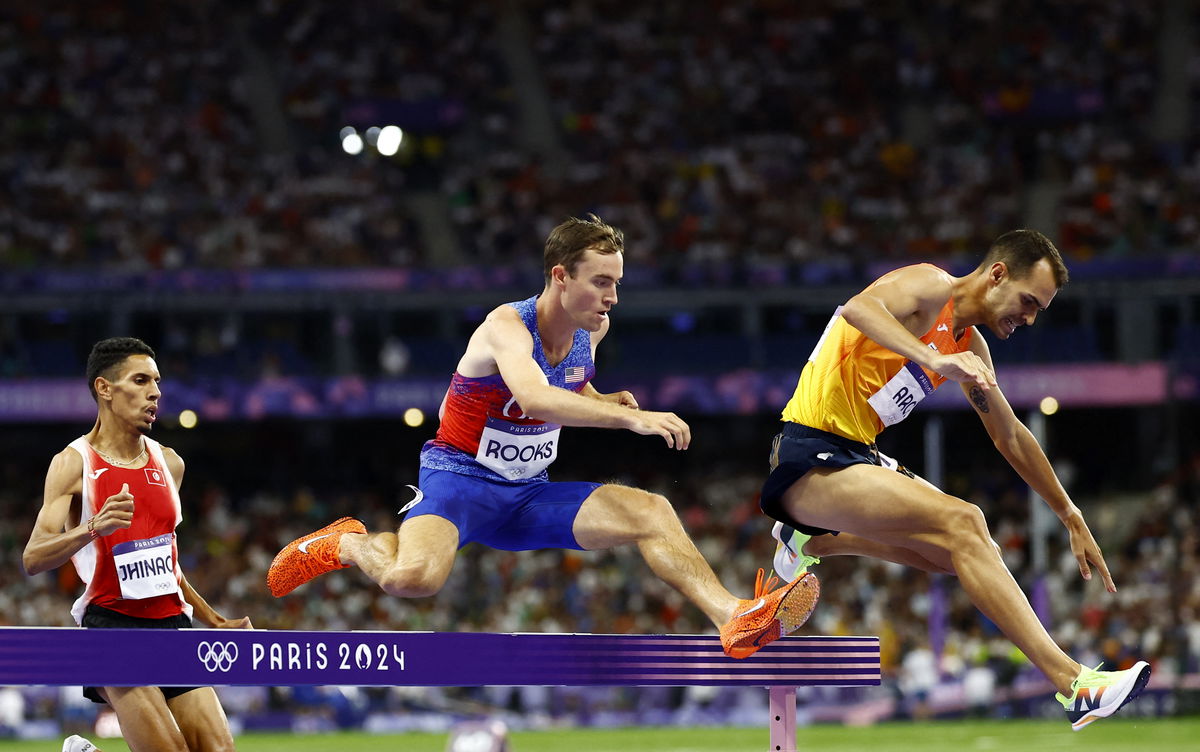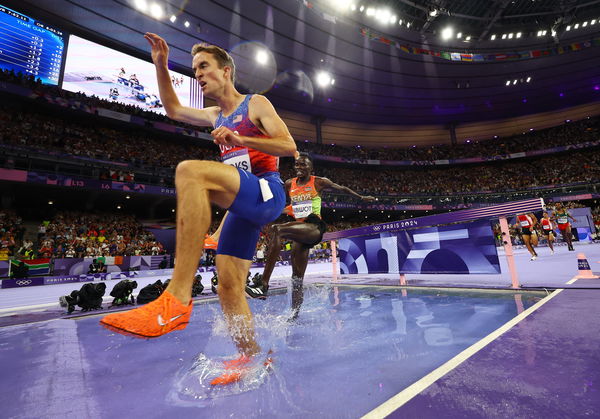
Reuters
Paris 2024 Olympics – Athletics – Men’s 3000m Steeplechase Final – Stade de France, Saint-Denis, France – August 07, 2024. Daniel Arce of Spain and Kenneth Rooks of United States in action. REUTERS/Sarah Meyssonnier

Reuters
Paris 2024 Olympics – Athletics – Men’s 3000m Steeplechase Final – Stade de France, Saint-Denis, France – August 07, 2024. Daniel Arce of Spain and Kenneth Rooks of United States in action. REUTERS/Sarah Meyssonnier
The months following Paris have tested even the Olympic silver medalist in ways he had not anticipated. The 25-year-old steeplechaser has called his campaign “a roller coaster season,” and the description is accurate. Two subpar indoor outings, a strong win in Los Angeles, a disappointing 5,000-meter race in Portland, and a collapse in Monaco all preceded his third consecutive US title in June. By the time Kenneth Rooks arrived in Tokyo for the World Championships, the former BYU standout carried both expectation and unease, still grappling with the heightened attention that followed his Olympic breakthrough last summer.
Watch What’s Trending Now!
Competing in the third heat of the men’s 3,000-meter steeplechase on the opening day, Rooks never looked comfortable and faded badly to finish 11th in 8:45.57, a full 31 seconds slower than his season best and 37 seconds off his personal record. The performance eliminated him from the semifinal round, a shocking outcome for an athlete who had appeared a strong contender for the final just days earlier. Training partner Dan Michalski, in contrast, advanced with an 8:28.76 third-place finish behind Soufiane El Bakkali and Lamecha Girma.
ADVERTISEMENT
And it was only after the race that Rooks disclosed the problem that had unsettled him during the competition. Asked about what had gone wrong, he explained while talking to Citius Mag, “Uh, well, I, I have been dealing with a, uh, joint issue off and on since the U.S. champs. Um, I don’t think that, that really played a huge effect on me today. Uh, something that I guess I had experienced that was a little unexpected today, uh, was I’ve been getting some congestion the last couple days, and it’s slowly been moving down into my chest.”
He went on to describe how the sensation worsened as the race began. He later shared, “I could feel like the congestion breaking up in my lungs like the first couple laps, and that just like freaked me out a little bit.” Rooks admitted he did not yet have full clarity on the episode. When pressed if he knew the underlying cause, he said, “I think I want to take some time to reflect on it to make sure that I pinpoint, uh, what the issue is. I have some ideas of what they, what it might be, but I just want to like reflect on, uh, I just want to do some some some reflection on like everything and figure out um get a clear answer rather than like just responding with my emotions right now.”
ADVERTISEMENT

ADVERTISEMENT
For an athlete still adjusting to life as an Olympic medalist, the Tokyo World Championships setback underscores the difficulty of maintaining consistency under both physical strain and public expectation. Rooks has openly acknowledged the weight that comes with the silver medal he earned in Paris, stating, “Once I won the silver medal, everyone expected me to do well in every single race. It has affected my ability to perform.”
ADVERTISEMENT
Now, with the world championships behind him and questions about his health unresolved, the Utah native faces an uncertain autumn. And amid the competitions, Rooks has struggled to reconcile the pride of his Olympic silver medal with the relentless expectations and pressures that followed.
Kenneth Rooks battles the burden of being an Olympic silver medalist
Kenneth Rooks discovered quickly that a silver medal altered every aspect of his professional life. What had once been a pursuit of steady improvement became a contest with expectation itself. He admitted he had welcomed the honor, but the accompanying weight intruded on his ability to perform with freedom. “I don’t want to avoid being a silver medalist; I want to embrace it, and I do; it’s just the pressure that comes with it.”
ADVERTISEMENT
That strain surfaced in uneven performances like Monaco, and he admitted that he faltered mentally when the race demanded persistence. He sought the guidance of a sports psychologist after recognizing that his fitness had not been reflected in the results. He described it as a process of understanding why the fight had deserted him at crucial moments. Even his training suggested he was capable of running in the low eight-minute range. However, his races did not always reflect that promise. He said, “Every time I line up for a race, I’m introduced as the silver medalist. That’s the title I carry.”
Yet he continued to insist that this was not a complaint, but a reality to be managed. Rooks had embraced the opportunities that came with the medal, including speaking requests, though they sometimes demanded more than he could accommodate. He acknowledged the attention as a “blessing,” while conceding that balance was often elusive, as he summarized, “Every season is its own journey and I want to get back to the basics that made me successful.”
ADVERTISEMENT
Now, after his recent confession at the Tokyo World Championships, track enthusiasts would just wait for his health update and speediest recovery.
ADVERTISEMENT
ADVERTISEMENT
ADVERTISEMENT